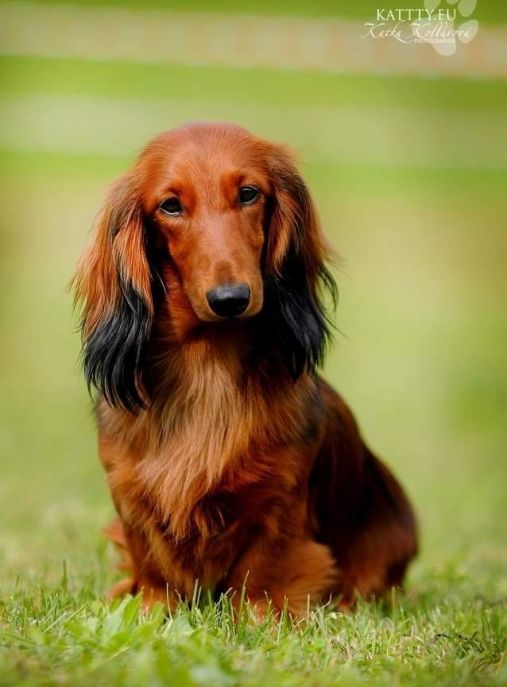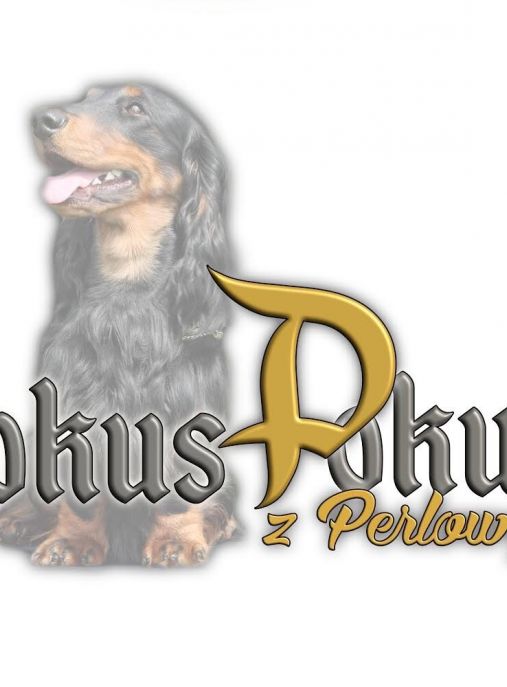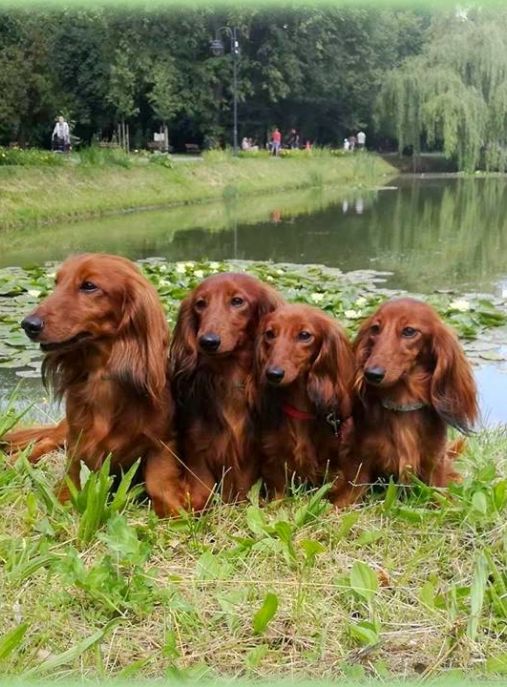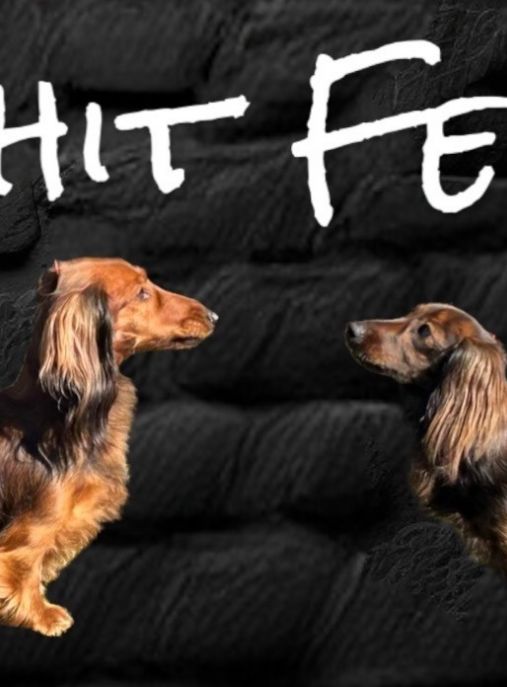The Dachshund Miniature Long-haired is a delightful and charming dog breed that captivates the hearts of many with its unique appearance and endearing personality. Known for its elongated body and short legs, this breed is a true epitome of cuteness. With its long, flowing coat, the Dachshund Miniature Long-haired stands out among its Dachshund counterparts, exuding an air of elegance and sophistication.
Originating in Germany, the Dachshund Miniature Long-haired is a descendant of the larger Dachshund breed, which was primarily bred for hunting badgers. The breed's name, "Dachshund," translates to "badger dog" in German, reflecting its original purpose. The Miniature Long-haired variety of Dachshund was developed by selectively breeding the standard-sized Long-haired Dachshund to create a smaller version with the same distinctive coat.
According to the Fédération Cynologique Internationale (FCI) typology, the Dachshund Miniature Long-haired belongs to Group 4: Dachshunds. This group includes all the different varieties of Dachshunds, such as the Miniature Smooth-haired, Miniature Wire-haired, Standard Smooth-haired, Standard Wire-haired, and the Miniature Long-haired. These groups are categorized based on their physical characteristics and intended use.
The Dachshund Miniature Long-haired is a versatile breed that can adapt to various lifestyles and living conditions. They make excellent companions for individuals and families alike, as they are known for their affectionate and loyal nature. Due to their small size, they are well-suited for apartment living, but they also enjoy outdoor activities and exploring their surroundings.
In terms of physical attributes, the Dachshund Miniature Long-haired typically weighs between 8 to 11 pounds (3.6 to 5 kilograms) and stands at a height of around 5 to 7 inches (13 to 18 centimeters) at the shoulder. Their elongated bodies are supported by short, sturdy legs, which give them a distinctive appearance. The most striking feature of this breed is its long, flowing coat, which requires regular grooming to maintain its beauty and prevent matting.
The life expectancy of the Dachshund Miniature Long-haired is generally between 12 to 16 years, although with proper care and a healthy lifestyle, some individuals have been known to live even longer. It is important to note that this breed, like many small dogs, can be prone to certain health issues such as intervertebral disc disease, obesity, and dental problems. Regular veterinary check-ups and a balanced diet are essential for maintaining their overall well-being.
One interesting fact about the Dachshund Miniature Long-haired is that their coat comes in a variety of colors and patterns. The most common colors include red, black and tan, chocolate and tan, and cream. Additionally, they can have various patterns such as dappled, brindle, and piebald. This diversity adds to their charm and makes each individual unique.
Despite their small size, Dachshund Miniature Long-haired dogs possess a courageous and determined personality. They are known for their strong hunting instincts, which can sometimes manifest as a stubborn streak. Early socialization and consistent training are crucial to ensure they develop into well-behaved and obedient companions.
In conclusion, the Dachshund Miniature Long-haired is a captivating breed that combines elegance, charm, and a playful nature. With its distinctive appearance and affectionate personality, it has become a beloved companion for many dog lovers around the world. Whether snuggled up on the couch or exploring the great outdoors, this breed brings joy and companionship to its owners.
The Dachshund Miniature Long-haired dog breed is known for its unique and charming character. These small dogs possess a big personality and are loved by many for their playful and affectionate nature. In this text, we will delve into the character of Dachshund Miniature Long-haired dogs, their behavior, and how to raise and train them.
One of the most prominent traits of Dachshund Miniature Long-haired dogs is their loyalty. They form strong bonds with their owners and are known to be extremely devoted. These dogs thrive on human companionship and love to be a part of their family's daily activities. They are often referred to as "velcro dogs" due to their tendency to stick close to their owners.
Despite their small size, Dachshund Miniature Long-haired dogs are fearless and confident. They possess a strong sense of self and are not easily intimidated. This can sometimes lead to stubbornness, so it is important to establish yourself as the pack leader from an early age. With consistent and positive training methods, these dogs can be obedient and well-behaved.
These dogs are also known for their intelligence. They are quick learners and enjoy mental stimulation. Engaging them in interactive games, puzzle toys, and obedience training can help keep their minds sharp and prevent boredom. However, it is important to note that their intelligence can sometimes lead to mischief if not properly channeled.
Dachshund Miniature Long-haired dogs are generally friendly and sociable. They get along well with children and other pets if properly socialized from a young age. However, they can be wary of strangers and may exhibit protective behavior towards their family. Early socialization and exposure to different people, animals, and environments are crucial to ensure they grow up to be well-rounded and confident dogs.
When it comes to exercise, Dachshund Miniature Long-haired dogs have moderate energy levels. They enjoy daily walks and playtime but are not overly demanding in terms of exercise. Due to their long backs, it is important to avoid activities that put strain on their spines, such as jumping from heights or excessive stair climbing. Regular exercise combined with mental stimulation will help keep them physically and mentally fit.
Grooming is another aspect to consider when raising a Dachshund Miniature Long-haired dog. Their long, silky coats require regular brushing to prevent matting and tangling. They are moderate shedders, so weekly brushing should suffice to keep their coats in good condition. Additionally, regular nail trims, teeth brushing, and ear cleaning are essential parts of their grooming routine.
In terms of training, Dachshund Miniature Long-haired dogs respond best to positive reinforcement techniques. They are sensitive dogs and do not respond well to harsh or punitive methods. Consistency, patience, and rewards-based training will yield the best results. Early socialization and obedience training are crucial to prevent any potential behavioral issues.
In conclusion, Dachshund Miniature Long-haired dogs are delightful companions with a unique character. Their loyalty, fearlessness, and intelligence make them a joy to be around. With proper training, socialization, and care, these dogs can thrive in any loving home.
Dachshund Miniature Long-haired dogs are adorable and affectionate companions that require specific care to ensure their well-being. Here is an extensive description of the recommended care for these delightful dogs, along with some essential tips on what to do and what not to do:
1. Grooming: The long, silky coat of a Dachshund Miniature Long-haired dog requires regular grooming to prevent matting and tangling. Brush their coat at least two to three times a week using a slicker brush or a comb with wide teeth. Pay extra attention to their feathered ears, chest, and tail. Regular grooming also helps to minimize shedding.
2. Bathing: Bathe your Dachshund Miniature Long-haired dog every 4-6 weeks or as needed. Use a mild dog shampoo and warm water, ensuring you rinse thoroughly to avoid any residue. Be cautious not to wet their ears excessively, as it can lead to ear infections. After bathing, gently towel dry or use a hairdryer on a low setting to prevent their coat from matting.
3. Nail Care: Trim your dog's nails regularly to prevent them from becoming too long and causing discomfort. Use a dog nail clipper or grinder, and be careful not to cut into the quick, which can cause bleeding. If you are unsure, consult a professional groomer or veterinarian for assistance.
4. Dental Hygiene: Dental care is crucial for Dachshunds to prevent dental diseases. Brush their teeth regularly using a dog-specific toothbrush and toothpaste. Additionally, provide dental chews or toys to help keep their teeth clean and healthy.
5. Exercise: Despite their small size, Dachshund Miniature Long-haired dogs are energetic and require regular exercise. Daily walks, playtime, and mental stimulation are essential to keep them physically fit and mentally stimulated. However, avoid excessive jumping or strenuous activities that could strain their long back and cause spinal issues.
6. Training and Socialization: Start training your Dachshund Miniature Long-haired dog early to establish good behavior and prevent any stubbornness. Use positive reinforcement techniques, such as treats and praise, to motivate them. Socialize them with other dogs, people, and various environments to ensure they grow up to be well-rounded and confident companions.
7. Health Care: Regular veterinary check-ups are crucial to monitor your dog's overall health. Vaccinations, parasite prevention, and annual blood tests are essential to keep them protected from diseases. Additionally, be cautious of their weight, as obesity can lead to various health issues, especially for their delicate backs.
What NOT to do:
1. Do not overfeed your Dachshund Miniature Long-haired dog, as obesity can lead to serious health problems, including back issues.
2. Avoid leaving your dog alone for extended periods as they thrive on companionship. Loneliness can lead to separation anxiety and destructive behavior.
3. Never force your Dachshund Miniature Long-haired dog to participate in activities that could strain their back, such as jumping from heights or excessive stair climbing.
4. Do not neglect their dental hygiene. Poor oral care can lead to dental diseases, which can be painful and affect their overall health.
5. Avoid using harsh training methods or punishment. Dachshunds respond best to positive reinforcement and gentle guidance.
Remember, each Dachshund Miniature Long-haired dog is unique, so adapt the care routine to suit their individual needs. By providing proper care, love, and attention, you can ensure a happy and healthy life for your beloved furry friend.
The Dachshund Miniature Long-haired dog breed is known for its charming and distinctive appearance, and one of the factors that contribute to their unique appeal is their wide range of coat colors. Among the various hues seen in these adorable canines, one of the most common and sought-after colors is the classic tan or red.
When we think of a Dachshund Miniature Long-haired dog, the image of a sleek and elegant creature with a lustrous tan or red coat often comes to mind. This color is typically dominant in this breed and is widely recognized as their signature shade. The tan or red coloration can vary in intensity, ranging from a light, sandy hue to a deep, rich red that exudes warmth and vibrancy.
The tan or red coat of a Dachshund Miniature Long-haired dog is characterized by its smooth and glossy texture. It is often silky to the touch, adding to the overall allure of these delightful canines. The coat is usually long and flowing, cascading down their bodies in soft waves, giving them an almost regal appearance.
The tan or red color is typically distributed evenly throughout the dog's body, with no specific patterns or markings. However, it is not uncommon to find slight variations in shade, particularly on the ears, tail, or face. Some Dachshund Miniature Long-haired dogs may have darker or lighter patches in these areas, adding a touch of individuality to their overall appearance.
One of the most fascinating aspects of the tan or red coat is its ability to accentuate the Dachshund Miniature Long-haired dog's unique physical features. The color beautifully complements their long and slender bodies, emphasizing their elegant proportions. It also enhances their expressive eyes, which are often dark and soulful, creating a captivating contrast against the warm tones of their coat.
The tan or red color of the Dachshund Miniature Long-haired dog is not only visually appealing but also holds historical significance. It pays homage to the breed's origins as hunting dogs, as this color allowed them to blend seamlessly with their natural surroundings while on the hunt. Today, it serves as a reminder of their heritage and adds to their timeless charm.
In conclusion, the tan or red color is a defining characteristic of the Dachshund Miniature Long-haired dog breed. Its rich and warm tones, combined with the silky texture of their coat, create a visually stunning and highly sought-after appearance. Whether they are frolicking in the park or lounging at home, these dogs exude elegance and grace, making them a beloved choice for dog enthusiasts worldwide.
The health of Dachshund Miniature Long-haired dogs is of utmost importance to ensure their overall well-being. These adorable and affectionate canines are prone to certain health issues, and it is crucial for owners to be aware of them in order to provide the best care possible.
One of the most common health concerns in Dachshund Miniature Long-haired dogs is intervertebral disc disease (IVDD). Due to their elongated bodies and short legs, these dogs are more susceptible to spinal problems. IVDD occurs when the discs between the vertebrae degenerate or herniate, causing pain, mobility issues, and in severe cases, paralysis. Regular exercise, maintaining a healthy weight, and avoiding activities that put excessive strain on the back can help prevent this condition. Additionally, providing ramps or stairs for them to access furniture or vehicles can reduce the risk of spinal injuries.
Another prevalent health issue in Dachshund Miniature Long-haired dogs is obesity. These dogs have a tendency to gain weight easily, which can lead to various health complications such as joint problems, diabetes, and heart disease. To maintain their weight, it is essential to provide them with a balanced diet consisting of high-quality dog food and appropriate portion sizes. Regular exercise, such as daily walks or playtime, is also crucial to keep them fit and active.
Dental problems are also common in this breed. Their small mouths and crowded teeth make them more prone to dental issues like tartar buildup, gum disease, and tooth loss. Regular dental care, including brushing their teeth with dog-friendly toothpaste, providing dental chews or toys, and scheduling professional dental cleanings, can help prevent these problems and maintain their oral health.
Dachshund Miniature Long-haired dogs are also susceptible to certain eye conditions. Progressive retinal atrophy (PRA) is a genetic disease that causes gradual vision loss and can eventually lead to blindness. Regular eye examinations by a veterinarian can help detect any early signs of PRA or other eye problems, allowing for timely treatment or management.
Additionally, Dachshund Miniature Long-haired dogs are prone to allergies, particularly skin allergies. These allergies can cause itching, redness, and skin infections. Regular grooming, including brushing their long hair to prevent matting and removing any potential allergens, can help alleviate these symptoms. It is also important to provide them with a balanced diet that meets their nutritional needs and avoids common allergens such as grains or certain proteins.
Regular veterinary check-ups are crucial for the overall health of Dachshund Miniature Long-haired dogs. These visits allow for early detection of any potential health issues and ensure that they receive necessary vaccinations and preventive treatments for parasites such as fleas, ticks, and heartworms.
In conclusion, while Dachshund Miniature Long-haired dogs are generally healthy and resilient, they are prone to certain health conditions. By being aware of these common diseases and taking proactive measures, such as providing a balanced diet, regular exercise, dental care, and veterinary check-ups, owners can ensure the best possible health and well-being for their beloved Dachshund Miniature Long-haired companions.
Dachshund Miniature Long-haired dogs are adorable and unique little creatures that require specific attention to their nutrition in order to maintain their overall health and well-being. These small dogs have a long, low body shape, which can put them at risk for certain health issues, such as obesity, joint problems, and dental diseases. Therefore, it is crucial to provide them with a balanced and appropriate diet to support their specific needs.
When it comes to feeding a Dachshund Miniature Long-haired dog, it is important to consider their size, age, activity level, and any specific health conditions they may have. Here are some guidelines and advice on how to properly feed and care for these delightful dogs:
1. High-quality dog food: Choose a premium, high-quality dog food that is specifically formulated for small breed dogs. Look for a brand that uses real meat as the primary ingredient and avoids fillers, artificial additives, and by-products. The food should meet the nutritional requirements set by reputable organizations like the Association of American Feed Control Officials (AAFCO).
2. Portion control: Dachshunds are prone to weight gain, which can lead to various health issues. Therefore, it is essential to monitor their portion sizes and avoid overfeeding. Follow the feeding guidelines provided by the dog food manufacturer, but also consider your dog's individual needs. Adjust the portions based on their activity level, age, and metabolism.
3. Frequent meals: Instead of feeding your Dachshund Miniature Long-haired dog one or two large meals a day, divide their daily food intake into smaller, more frequent meals. This helps prevent bloating and aids digestion, as their small stomachs are not designed to handle large amounts of food at once.
4. Lean protein: Protein is a crucial component of a Dachshund's diet. Opt for lean sources of protein such as chicken, turkey, fish, or lamb. These proteins help maintain muscle mass and provide essential amino acids for overall health.
5. Healthy fats: Include healthy fats in your Dachshund's diet, such as omega-3 fatty acids found in fish oil or flaxseed oil. These fats support their skin and coat health, reduce inflammation, and promote brain function.
6. Fiber-rich foods: Dachshunds can be prone to constipation, so including fiber-rich foods like pumpkin, sweet potatoes, or green leafy vegetables can help regulate their digestion. However, avoid excessive fiber intake, as it can lead to loose stools.
7. Dental health: Dachshunds are prone to dental diseases, so it is important to promote good oral hygiene. Feed them dry kibble or incorporate dental chews and toys designed to clean their teeth. Regular brushing is also recommended.
8. Avoid table scraps: While it may be tempting to share your food with your furry friend, it is best to avoid feeding them table scraps. Human food can be high in fat, salt, and spices, which can lead to digestive upset or even pancreatitis in Dachshunds.
9. Avoid excessive treats: Treats are an excellent way to reward and train your Dachshund, but be mindful of the quantity. Excessive treats can contribute to weight gain and nutritional imbalances. Opt for small, healthy treats or consider using their regular kibble as rewards during training sessions.
10. Fresh water: Always provide your Dachshund Miniature Long-haired dog with fresh, clean water. Hydration is crucial for their overall health and helps maintain proper kidney function.
Remember, every dog is unique, and it is important to consult with a veterinarian to determine the specific dietary needs of your Dachshund Miniature Long-haired dog. They can provide personalized advice based on your dog's age, weight, and any existing health conditions. By providing a balanced and appropriate diet, you can ensure your Dachshund lives a long, healthy, and happy life.













